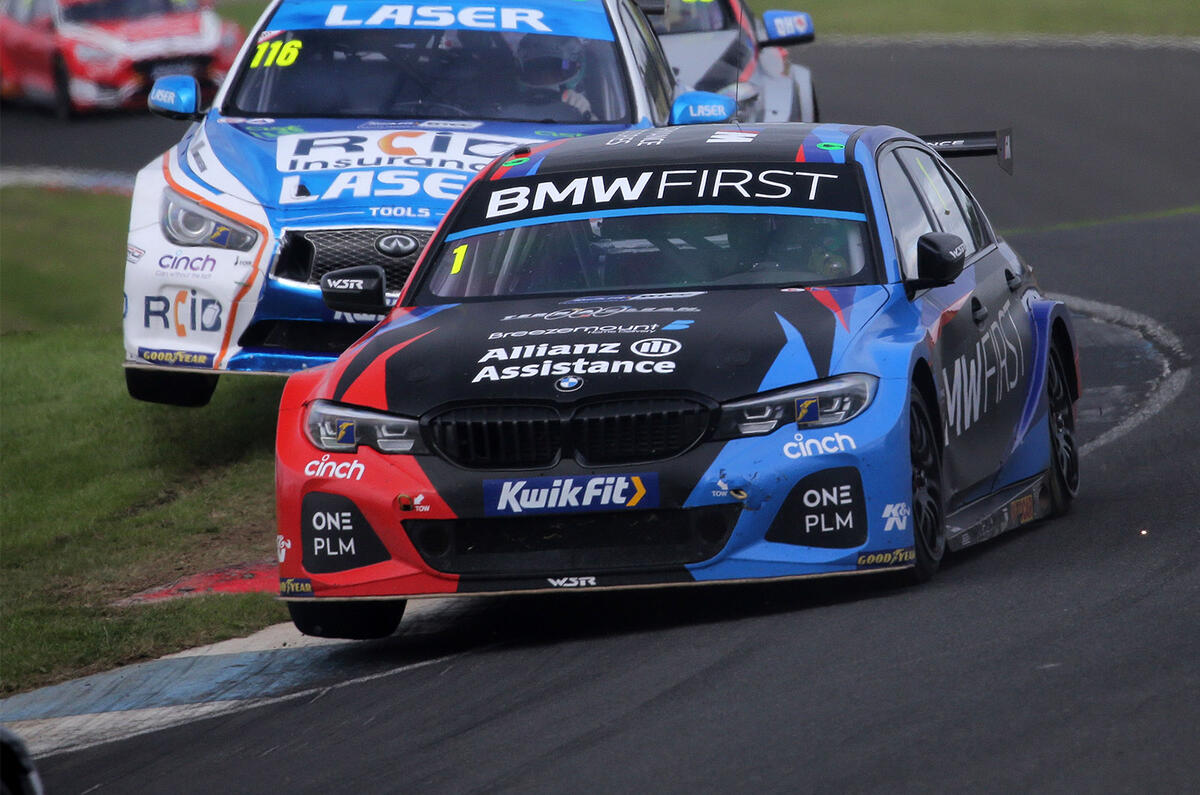In this mixed-up year, here’s a familiar thing: the British Touring Car Championship (BTCC) title will be settled by a multi-driver shootout in the Brands Hatch season finale.
Two wins for BMW’s Colin Turkington at Snetterton gave him a narrow points lead over Ash Sutton, with Dan Cammish, Tom Ingram and Rory Butcher also in contention. Yet again the title will be decided over three races at the Kent track.
The current BTCC rules are designed to keep the field close. Tightly controlled technical regulations, success ballast and a partly reversed grid for one race at each meeting prevent one driver or team from dominating, while having three races at each meeting naturally widens the list of title rivals for the season finale.
These rules may upset some purists, who say they penalise the best drivers and teams in favour of ‘entertainment’. It’s similar to the argument of those who rail against attempts to introduce ‘gimmicks’ such as reverse grids in Formula 1. But I’m not sure that it holds true over the course of a season.
Certainly, the BTCC’s rules lead to a much wider mix of drivers winning races, but the best drivers rise to the top: Turkington has taken a season-best five wins, while Sutton has four. And both have tailored their approaches to the rules.
The key to winning a BTCC title is to maximise results at circuits that suit your car and to minimise losses elsewhere and when laden with ballast. After a disastrous weekend at Croft, Turkington dominated the first two races at Snetterton. But even more impressive was finishing third in race three, ahead of his title rivals, despite maximum ballast and starting mid-grid. There’s a reason why he’s chasing a record fifth title. Another title guaranteed to have a multi-driver final-race showdown is the Nascar Cup Series, because, like other sports in the US, it has playoffs. It’s complex, but basically the top 16 after the ‘regular season’ fight for the title in the last 10 races. The field is whittled down at regular intervals, with the final four drivers competing in a one-race, winner-takes-all showdown as the season finale. It guarantees drama.
You could argue that it devalues the season-long effort usually required to win a title, but I’m not sure that’s true, even if it is a step too far for my taste. The playoffs put a heavy emphasis on wins over points, and drivers and teams adapt their strategies to suit. This system has changed the nature of the racing and upped the intensity. Drivers have to be worthy to reach the final four.
Is it the best way to determine the best driver over the course of a season? Of course not. But does it produce a worthy champion? Absolutely. And so does the BTCC’s format, along with pretty much every other one that features some level of performance balancing. In each case, drivers know the rules going in and adapt to fit them.
I understand the opposition to ‘gimmicks’ being introduced in F1 to mix up the competition, but I don’t think they should be dismissed for reducing the purity of the sport. The BTCC shows that the best drivers will still emerge on top and, by having to adapt race by race, they have to show a broader skillset than when simply dominating in the best car.








Join the debate
Add your comment
BTCC is limp racing.
Annoying little mainly FWD buzz boxes not doing anything interesting with all sorts of rewarding failure fixes in order to entertain. Stopped watching this farcicle racing over 20 years ago. Despite that it seems that someone is chasing their 5th title, I thought the rewarding success with failure and vice versa rules were there to eliminate these things from happening.
Please Explain
What does that have to do with the topic at hand?
Well.
Well, the way I see, not having huge investments in teams in the UK, means there's no total domination, not the same two cars winning most of the races, and, when the crowds get to return, it doesn't cost a fortune to go watch not only touring, but the support races too.
Money, money ,money!
That's the big difference, costs millions to do F1, plus its global!